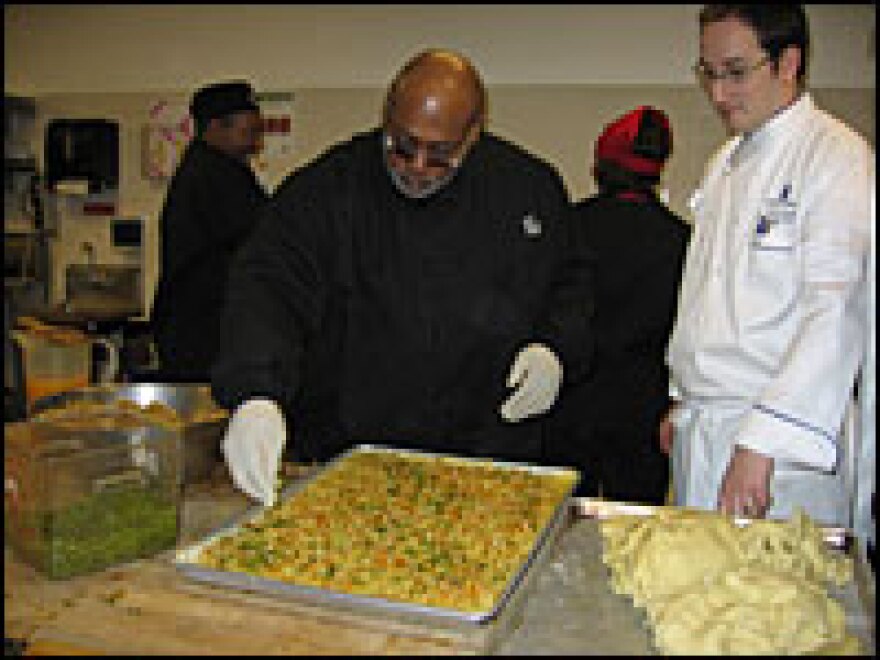DC Central Kitchen, a charity organization, got its start 20 years ago this week by collecting leftover food from the inaugural balls of George H. W. Bush and giving it to the homeless. Now, the group's culinary arts students — many of whom have been homeless themselves or in prison — are helping with some of the cooking for this year's inaugural festivities.
Jerome Girardot is the pastry chef at the Ritz-Carlton in Washington. He's greeting half a dozen students from DC Central Kitchen who are here to bake Michelle Obama's favorite shortbread cookies.
Girardot takes the students, all wearing black chef jackets and caps, into the hotel's walk-in refrigerator, where large metal trays hold slabs of dough.
"We started already making it, so one of you is going to roll it out," Girardot says. "One of you is going to egg-wash it, put the dried fruit and nuts on top, bake it. Two of you are going to cut it. We have to make about 8,000. So that's a lot of cookies."
Jars of them will be handed out as gifts for the hotel's inaugural guests.
Makeisha Daye bends over the conveyor belt of a large metal machine that is used to flatten the dough into sheets. She lost her job and faced eviction from her home before entering the DC Central Kitchen's culinary program. Now, she's thrilled to play even a minor role in the inauguration of the nation's first black president.
"This is his wife's recipe, so it's an honor — it's an honor and a privilege, actually," Daye says. "I can share with my 4-year-old that I'm a part of history."
Student Curtis Cunningham flips a sheet of dough onto a tray, then takes a paint brush to cover it with egg so the toppings will stick.
"I'm sprinkling the orange and lemon first, then I'm placing the pistachios," Cunningham says.
He presses the toppings down before the sheets go in the oven. Cunningham and the others from DC Central Kitchen are almost finished with their 12-week culinary course, and they're helping with several inaugural events.
They've also begun to look for jobs — the group has placed about 98 percent of its graduates. That's more than 700 over the years, and like Cunningham, many are ex-offenders. He got out of prison last year, after serving 15 years for attempted robbery and a long criminal record.
"I had 33 arrests and 13 convictions," he says. "But I have totally changed from what I used to be. When I first came into the program, I had this attitude like the world owed me something. They turned me around. They talked to me, they worked with me. You know — my people skills."
They also worked on his cooking skills — he can't wait to start making meals. Robert Egger, who founded DC Central Kitchen, says a lot has changed since that first inauguration, when he shuttled bowls of lobster bisque to homeless shelters. The culinary excesses of the time kept his operation alive.
"For the first five years of the kitchen, I was up almost every night at 1 or 2 o'clock in the morning, because caterers were calling," Egger says. "It was roast beef and shrimp, and keep it coming all over this city."
He says these days, there are few leftovers. Caterers have gotten smarter and more efficient. That's why nonprofits have to be smart, too, about how they help people — which is one reason for the culinary arts program and the opportunities it provides.
"First, it was 'give us your food,' " Egger says. "Then, it was: 'Hey, can we get students involved in preparing meals for the inauguration?' Our goal now is we want students to go to the White House and prepare a meal for a state dinner."
He's optimistic that might happen. One of the program's graduates now cooks at Blair House, where the Obamas are staying before moving into the White House.
Copyright 2023 NPR. To see more, visit https://www.npr.org.



